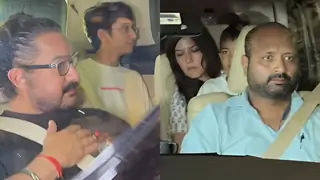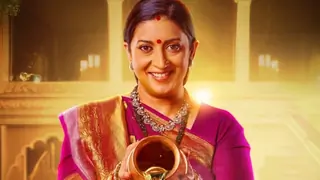HEADS OVER HEELS
Raavan falls for Sita (and vice versa) in an intriguingly idiosyncratic take on the Ramayana – if you can get past the lead performances, that is.
JUN 20, 2010 – WHEN I HEARD THAT MANI RATNAM WAS SHOOTING an antagonist-centric update of the Ramayana, titled Raavan, in the darkest hearts of distant jungles, I wondered if the attempt was to delineate the villain through his surroundings, like how the untamed moors are a manifestation of Heathcliff's uncivilised inner life. As it turns out, it's more an excuse to allow the cinematographers to run riot. No one, really, walks into a Mani Ratnam movie expecting a mumblecore aesthetic, but even by his skyscraping standards, Raavan is a spectacle – perhaps too much so.
We could have used more shots like the one in the Kata kata song sequence that contrasts the swirling colours of wedding revelry at an upper level with the khaki of swarming policemen below. The image is held for a mere instant and yet manages to hint at imminent dread – it's simultaneously pretty and pragmatic. But take this other shot, of Ragini (Aishwarya Rai Bachchan), who's been kidnapped by Beera (Abhishek Bachchan) and who screams for help from the edge of a lake whose shore is littered with gleaming shards of black rock. Instead of responding to her distress, you're wondering how a similar tile-design would look in your living room. The image is so shabby-chic, it looks like the jungle as imagined by an interior decorator.
If there's a movie that Mani Ratnam could have gone mumblecore with, it's this one, a psychologically driven art film dressed up as glitzy, plot-motivated commercial cinema, with fussed-over Sabyasachi costumes on a heroine who's never allowed to look anything less than breathtaking. Even her bruises are beautiful. It takes real effort to pull your eyes away from the sparkling surface and peer deep into the narrative, which reimagines the Ramayana in an intriguingly idiosyncratic fashion.
At first, you wonder what more can be done with this musty epic. There have been metaphorical extrapolations like Lajja, which dealt with multiple Sita figures strewn throughout the journey of a repressed Sita-figure rediscovering herself. Then there are the more literal adaptations like Neelkamal and Khalnayak. In the former, a chaste wife is suspected of infidelity, chased away while pregnant, and forced to take refuge at the feet of a holy man until the helpful Hanuman played by Mehmood engineers a deliverance. And Khalnayak had monkeys surrounding the hero and villain locked in mid-fight, along with a proto-feminist Sita who went after Raavan in order to nab him for her Ram. Pinjar, too, dealt with the gradual easing of anxieties between a hapless victim and her abductor, a Raavan who wasn't a mythological moustache-twirler so much as a life-sized human being whose only blemish was being painted in grey shades.
So when we enter Raavan, it's with the question whether Ratnam is going to do, again, what worked so winningly in Thalapathi, where he retold the Mahabharata without actually reimagining it. It was a straightforward interpretation situated in the modern day. Raavan, too, has its share of parallels with its source material – an exile based on the number fourteen, the villain's sister being hauled up by the nose, a bridge connecting protagonist and antagonist, the lovable sidekick-monkey (cheerfully played by Govinda, and named Sanjeevini Kumar) who even rattles off couplets styled like the Chaleesa. And once again, Ram (a scowling Vikram, who doubtless had more opportunity to flex his acting chops in the Tamil version, as Raavanan) casts unjustified and uncharitable doubt on Sita-Ragini's chastity, when she's attired in virgin-white, no less.
But this Ram – named Dev (like the deity that he is), and employed as an SP (like the upholder of dharma that he is) – isn't beyond torturing an armless man to extract information about his abducted wife's whereabouts, or shooting a messenger of peace in the back after guaranteeing non-violent negotiations. No wonder the latter scene plays out in the dark of night, as befits the deeds of demons, witnessed only by a mute moon. Beera, on the other hand, is introduced with the sun shining over him, and even when he kidnaps Ragini, it's in broad daylight (as opposed to the skulking maneuvers of a villain). The fight on the bridge may have these adversaries in their mythical colours – Ram in white, Raavan in black – but the narrative doesn't paint them so conveniently.
Like Ram Gopal Varma did with his Sarkar films – trusting that we know the overall arc of the Godfather saga and therefore do not need to be shepherded through minutely detailed plot points – Ratnam abandons a linear this-happened-then-that-happened story in favour of flavourful highlights that simultaneously replay and reinterpret what we already know. How does Dev, in his quest to annihilate Beera, sniff out the location of the wedding of Beera's sister (Priyamani)? Or how does Sanjeevini wend his way to Ragini in the midst of her armed captors? These are questions that need no answers. Ratnam knows that we know the answers in our heads, and this liberates him to pursue a level of narrative abstraction we haven't witnessed since the first half of Dil Se.
Because of this approach, the outside-world issues that usually gnaw at us in this director's films – like the political environment of the town of Laal Maati (Red Earth) – cease to matter. Ragini wonders if Beera is Raavan or Robin Hood, and that's all we need to know, that this villain is for the exploited and against the establishment. (He is, in short, another Nayakan.) There's little use pondering if the redness of this earth is an indication of Beera's communist-Maoist leanings, because the story unfolds at an abstract-mythic level. The more urgent subtext is that of the moral victory of the uncivilised over the civilised. The educated Dev is more savage than the unlettered jungle dwellers – even Sanjeevini, with his halting English, seeks a peaceful resolution to the conflict, while Dev prefers to let his gun do the macho talking.
Ratnam hasn't completely broken away from the homey style we've come to associate with him. An interlude with Beera, his sister and her fianc is a typically endearing example of fleeting characters being established with colourful brushstrokes and too-quippy dialogue. And there are several moments so loaded with pointed detail that they reveal themselves only upon looking back – the rape victim who refuses to uncross her legs even after she reaches home, the poetic justice of a tragedy in water being avenged by an abduction in water, a bird's eye view of Ragini turning out to be a literal bird's eye view (and Ragini being associated, later on, with this bird; "chidiya ki tarah phadphada rahi hai"), or the whisper of a kinky sex life in the case of Dev and Ragini, whose bedroom is walled with mirrors.
Further familiarity comes from the invocations of images from earlier Mani Ratnam movies – the rains, the mirrors, the cigarette-smoking hero, the gargantuan statue in the wilderness (from Kannathil Muthamittal), the man slinging along huge fish (Aayitha Ezhuthu), the song sequence of boisterous revelers in the rain (Nayakan), the trauma of rape leading to terrorism (Dil Se), the camera swooping madly around a triangular formation of characters (from Thiruda Thiruda; what are the bets that the Jimmy Jib operator ended up with a six-pack after the Raavan shoot?), the song sequence featuring a spouse in an abandoned cottage dreaming of a loved one who dances with children (from Roja), and indeed, the plot of Roja itself, only gender-reversed this time around, the husband setting out in search of the kidnapped wife.
But these totemic images apart, Ratnam, in Raavan, doesn't set out to pleasure his audience in ways we expect him to. There are, naturally for a story of this nature, the de rigueur masala moments, like the whistle-worthy scene where Dev burns holes in a newspaper image of Beera and his merry men – but the other must-haves of commercial cinema are glossed over. Ratnam stages AR Rahman's songs as if they were perfunctory pit stops along the way, and were it not for commercial-film considerations, these speed-breaker music videos could have been dispensed with altogether. Ratnam is not terribly interested in genre thrills either. The action sequences are equally perfunctory, a hazy clutch of hyper-edited movement that registers at a corner of the eye.
Even the drama is free of detonations. You expect the abduction to be a frantic set piece, and instead, it's a serene image of boats colliding on a lake. You expect Dev to come home and find his wife missing and go crazy with worry, and instead he receives the news over a walkie-talkie and signs out grimly, betraying not a flicker of emotion. (In fact, were it not for the snappy happier-times flashback, with those kinky mirrors, we might have wondered about the kind of marriage that Dev and Ragini had, and the stunning climax hints at more domestic trouble.) Even Hanuman's withdrawal from Lanka (namely, Laal Maati) isn't through a flaming circus act but a lengthy stretch of grown-up conversation.
The most interesting aspect of the narrative, however, is the way it holds back information in favour of later-on revelations that reshape our earlier experience. When we first see Beera, he has a plaster on his throat, but only later do we realise that this wound is a marker of how recent a tragedy was, a fact never spelled out in words. When a gold watch is given to someone, or when his hand is subsequently chopped off, or when a policeman is tonsured and tortured, we are outraged on their behalf, until later events inform us that they may well have deserved their fates. With commercial cinema, the expected style of narration is to establish a tragedy first, get the audience to empathise, and then punish the wrongdoers so that we can rejoice in their being brought to well-deserved justice. But here, our emotions are constantly confounded. Heroes turn villains at the bat of an eyelid, while villains display stoic reserves of heroism.
The equally unexpected love triangle is set up in one deft visual. Dev holds out a photograph of Ragini to tribals, asking if they've seen her. And slowly, he slides out a photograph of Beera that was hidden behind Ragini's. Beera, now, has literally come between Dev and Ragini, and his thawing towards his victim is amongst the most extraordinary passages of Raavan. Ranjha ranjha echoes in the background – not the sprightly love song from the soundtrack album, but a lovelorn dirge that sounds as if rendered by a meth-addict whose fix has just kicked in. Over the refrain Jal jaa jal jaa ishq mein jal jaa, Beera is inflamed by Ragini's attempts to escape – at one point, his hands hover over her breasts until sense prevails.
And she responds too, for in the next scene, she's attired like one of them. She asks to be set free, but her request, now, is a statement, not the scream from before. Even she seems unconvinced. That's why Ragini seeks reassurance that Dev still loves her, that the mere idea of him is still worth hanging on to in the presence of this new attraction in her life. When Beera says that he saw a picture in Dev's tent, she looks at him expectantly, and her face falls when he says it was his picture. (The line, however, is hilarious: "Raja ke tambu mein rakshas ka photo.") And later, when Sanjeevini appears just as she's discovered that her husband may have contributed to her plight, she reacts not with happiness but hesitation. "Woh khud kyon nahin aaye?" she asks Sanjeevini. That's what she wants to know first, why Dev did not come to claim her.
It's tempting to think what a better actress, one less prone to dainty posturing, might have accomplished with this character, but Aishwarya, to her credit, at least, doesn't frustrate you to the extent that her real-life husband does. The most baffling aspect of Raavan is Abhishek Bachchan's embodiment of the eponymous villain. He has a superb scene where, after letting Ragini go in a fit of weakness, he imagines her in his clutches again and shoots at her, just to prove to himself that he's still got his edge. He's as still as death, his face a stony mask. The effect is chilling.
But elsewhere? Imagine Toshiri Mifune in a Noh-styled Kurosawa drama imbued with the gesticulations of a silent-film scoundrel, and hissing like a rattlesnake making furious love to a tambourine – and you have the general idea. (Bachchan's scenes are often shot with a jittery camera, possibly to highlight how unhinged he is, but this only accentuates how off-putting the performance is.) If the attempt was to be crowd-pleasing in the mythical (or even masala) sense while staying true to character, he might have looked closer at costar Ravi Kishan, who plays Beera's loyal brother. The latter, with half the effort, achieves twice the effect.
































45